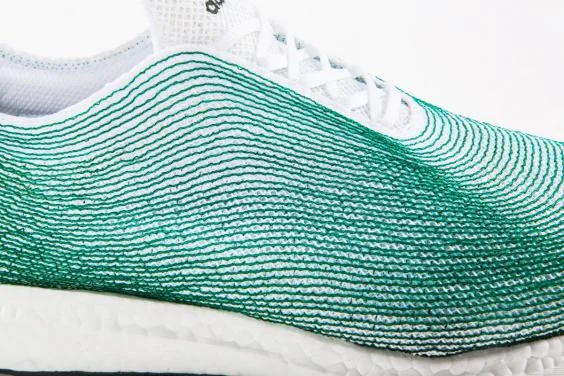Adidas’ latest running shoe is subtle and soft-looking, with stitching that evokes the sea. It’s also made almost entirely from plastic recovered from the ocean.
Last year, Adidas teased a prototype of a shoe that it was working on to clean up the oceans and adjust its supply chain to better reflect the constraints of climate change.
Take Action: Check Your Voter Registration Status With 'Just Vote' Here

Read More: Brands to Buy If You Want to Make the World a Better Place
Partnering with Parley for the Oceans, a non-profit committed to reducing plastic waste in the oceans, Adidas developed a finished product earlier this year with 95% ocean plastic recovered from near the Maldives.
And the shoe isn’t just a gimmick. It represents real change for the brand.
Read More: Adidas Is Making Swimsuits From Ocean Plastic, Too
Soon, 7,000 pairs of the “UltraBOOST Uncaged Parley" will be on sale for $220 each. In 2017, the brand aims to produce 1 million pairs of the sneakers from more than 11 million plastic bottles. Eventually, Adidas strives to eliminate virgin plastic from its supply chain altogether and hopes to expand its plastic cultivation to much more of its product line.
As Adidas notes on the product page, the shoes are “ spinning the problem into a solution. The threat into a thread.”

This initiative gives consumers everywhere something to root for. It allows them to show their appreciation for the oceans and could potentially spur other companies to see the ocean’s waste problem as an opportunity for innovative environmentalism.
From threat to thread. This is just the start.
— Parley (@parleyxxx) November 4, 2016
Sign up at https://t.co/1LtR9H3TEw#adidasParley#ParleyAIR@adidaspic.twitter.com/eMMiiDm64y
Read More: These Skateboards and Sunglasses Are Cleaning Up the Oceans
It’s no secret that the world’s oceans are filled with plastic and that this is harming marine life.
Each year, 8 million tons, or 16 billion pounds (7.2 billion kilograms) of plastic enter the world’s oceans. There are about 5.25 trillion pieces of plastic in the oceans today. Big pieces of plastic are routinely ingested by animals who then face a range of health problems. As plastic breaks down it leaches toxic chemicals into the water and deteriorates into small debris that blanket the ocean’s floors and are ingested by organisms up and down the food chain.
On its own, Adidas is merely chipping away at the problem, but the huge multinational corporation is shining a light on the problem and is lending credibility to clean-up efforts.
Read More: Does Recycling Your Clothes Actually Make a Difference?
When supply chains become circular and self-sustaining, the environment is protected from overexploitation and pollution. If this became the norm, then environments everywhere would be saved. And then there’d be a lot more space to test out these sneakers.